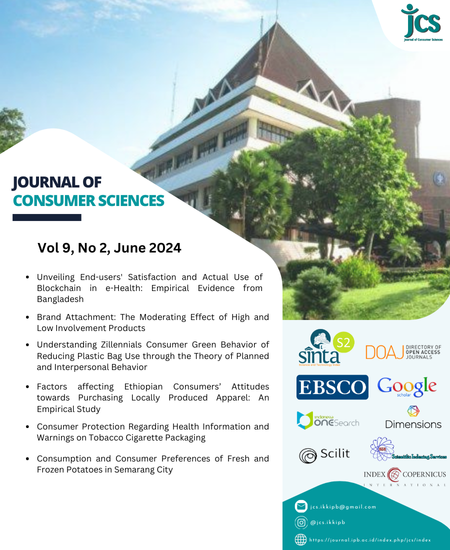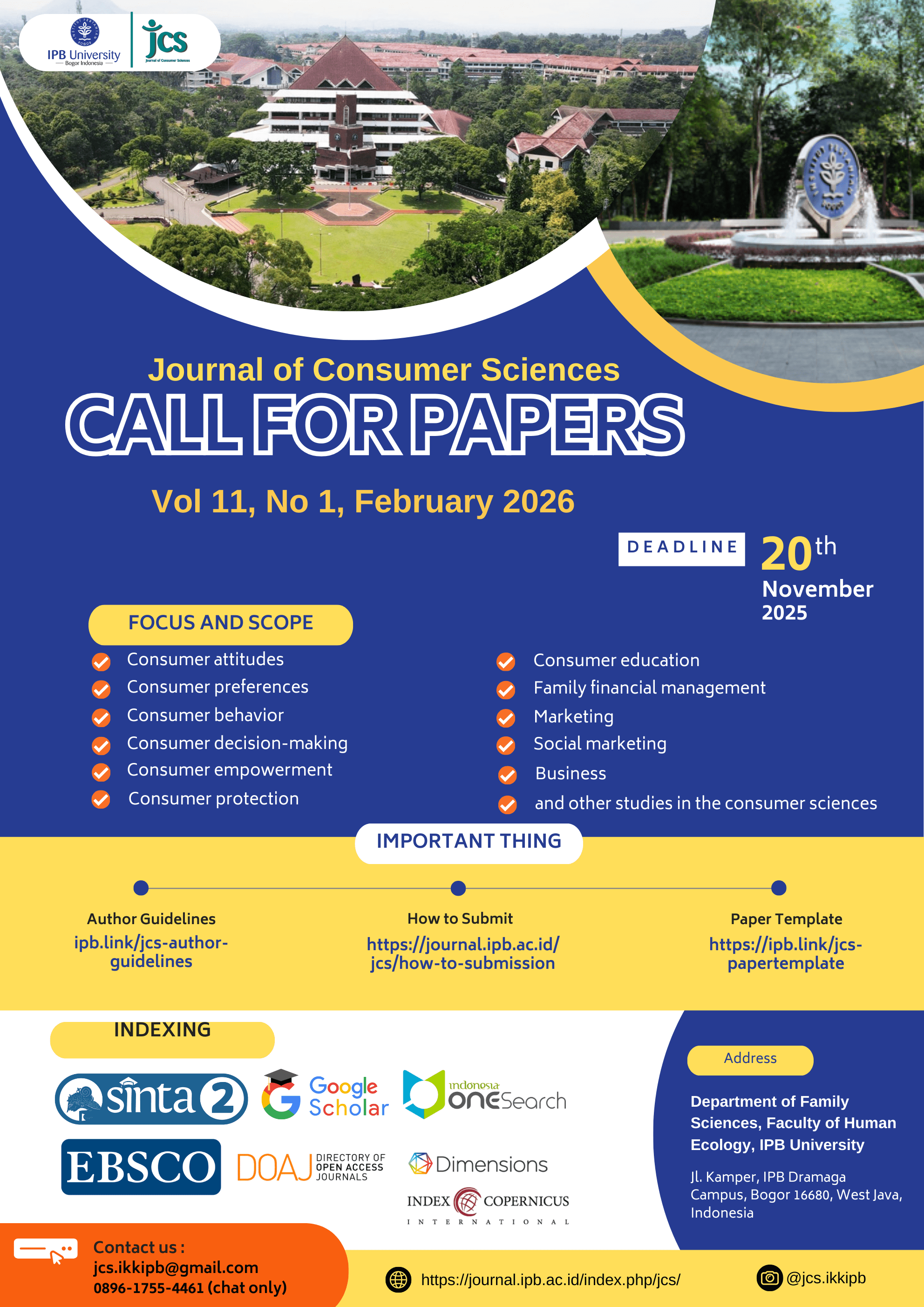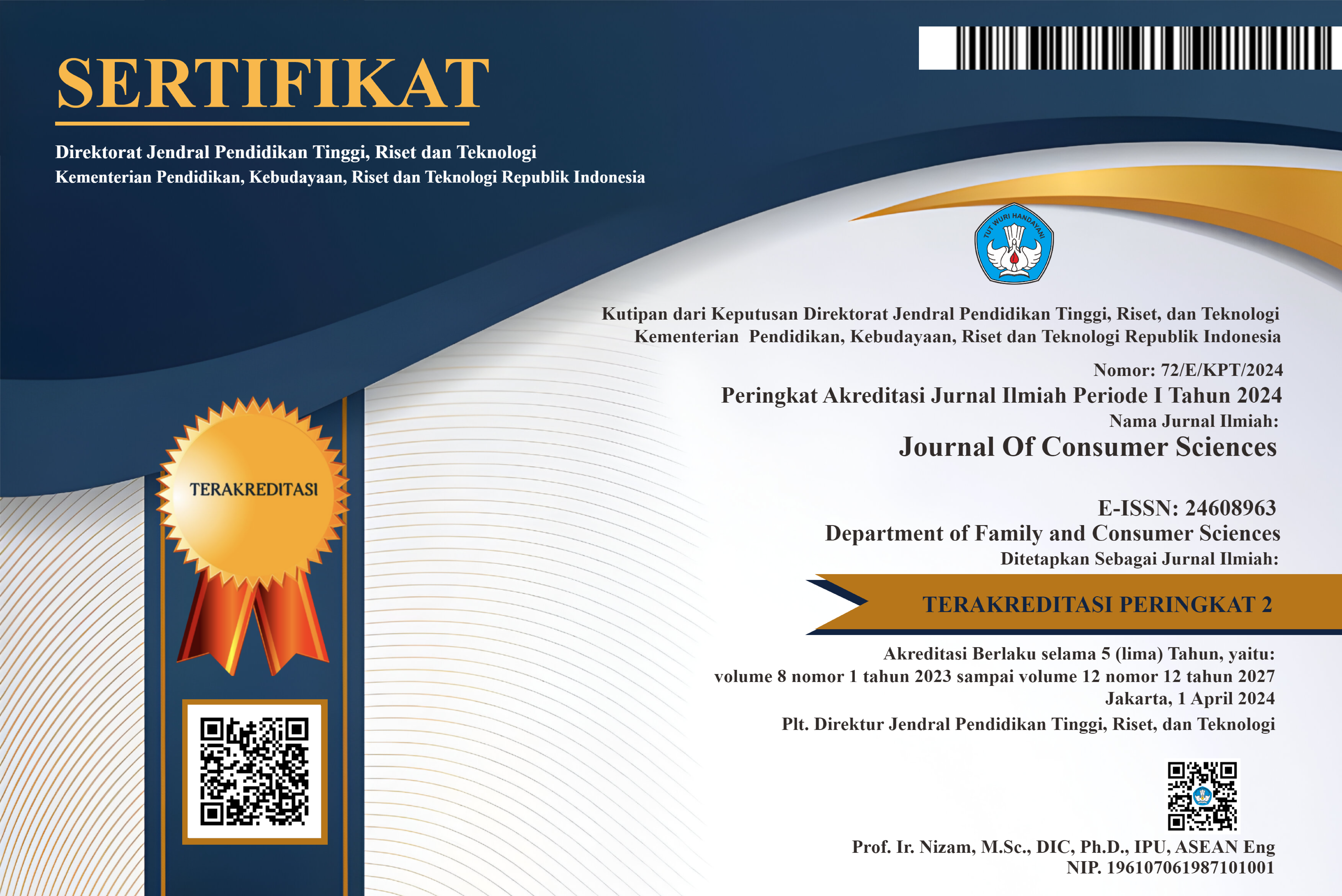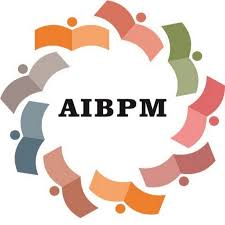Understanding Zillennials Consumer Green Behavior of Reducing Plastic Bag Use through the Theory of Planned and Interpersonal Behavior
DOI:
https://doi.org/10.29244/jcs.9.2.206-225Keywords:
consumer behavior of reducing plastic bag use, environmental awareness of plastic bags, habit of bag use, intention to use cloth bags, social pressure, support for the banning plastic bagsAbstract
Adopting cloth bags over single-use plastic bags is a significant consumer behavior. Employing the theory of of planned and interpersonal behavior, this study aimed to understand the relationship between customers' intentions to use cloth bags and their awareness of the environmental impact of plastic bags. Through purposive sampling, 277 individuals born after 1980 and making at least one to three in-person retail and Internet purchases each month were selected as participants. The data were processed using descriptive and quantitative analysis tools using SEM (Structural Equation Model) analysis. The findings reveal that creating the next generation of habit bags can significantly enhance social awareness of plastic bag usage and the environment. However, no evidence suggests that the EAPB increases the intention to use cloth bags. The more the SP and SBPB intervene, the more the IUCB contributes to changing consumer behavior to use fewer plastic bags. Therefore, Habit Bag Use can positively influence pro-environmental behavior, as this study combined the theory of Interpersonal Behavior and the theory of Planned Behavior. These results contribute to the theoretical framework for understanding how the millennial generation's interpersonal conduct, reflected in their bag-using behaviors, influences their behavior in minimizing plastic bag usage. These findings imply that the adoption of single-use or non-plastic bag habits can motivate people to reduce their usage of plastic bags, a behavior that is further encouraged by laws prohibiting the use of plastic bags.
References
Alam, O., Billah, M., & Yajie, D. (2018). Characteristics of plastic bags and their potential environmental hazards. Resources, Conservation and Recycling, 132, 121–129. https://doi.org/10.1016/j.resconrec.2018.01.037
Annisa, M., Asrani, Salima, S. R., Handayani, M., & Norhayati, L. (2022). Identifying environmental awareness of Indonesia's elementary school students in South Kalimantan. International Journal of Social Science and Human Research, 5(5), 1587-1591. https://doi.org/10.47191/ijsshr/v5-i5-06
Ari, E., & Yilmaz, V. (2017). Consumer attitudes on the use of plastic and cloth bags. Environment Development and Sustainability, 19(4), 1219–1234. https://doi.org/https://link.springer.com/article/10.1007/s10668-016-9791-x
Ardhiyansyah, A., & Iskandar, Y. (2023). Why do consumers buy paper bags? the impact of habit, consumer awareness and sustainability as drivers of environmentally responsible consumer behavior. The Es Economics and Entrepreneurship, 2(2), 61-75. https://doi.org/10.58812/esee.v2i2.193
Ashwini, V., & Aithal, P.S. (2024). Quantitative ABCD analysis: consumers’ purchase intention for eco-friendly bags. International Journal of Management, Technology and Social Sciences (IJMTS), 9(1), 1–32. https://doi.org/10.47992/IJMTS.2581.6012.0330
Bartolotta, J. F., & Hardy, S. D. (2021). Ban the bag: support for plastic bag reduction strategies in Northeast Ohio. Journal of Contemporary Water Research & Education, 174(1), 61-84. https://doi.org/10.1111/j.1936-704X.2021.3361.x
Bamberg, S., Ajzen, I., & Schmidt, P. (2003). Choice of travel mode in the theory of planned behavior: the roles of past behavior, habit, and reasoned action. Basic And Applied Social Psychology, 25(3), 175–187. https://doi.org/10.1207/S15324834BASP2503_01
Batooli, Z., Zarein-Dolab, S., Mohamadloo, A., & Rahimzadeh, M. (2022). Using theory of planned behavior to determine consumer intention in choosing cloth vs plastic bags. Applied Environmental Research, 44(1). https://doi.org/10.35762/AER.2021.44.1.5
Chan, R. Y. K., Wong, Y., & Leung, T. K. (2008). Applying ethical concepts to the study of ‘“green”’ consumer behavior: an analysis of Chinese consumers' intentions to bring their own shopping bags. Journal of Business Ethics, 79, 469–481. https://doi.org/10.1007/s10551-007-9410-8
Cote, D. (2019). Banning plastic shopping bags: raising environmental consciousness on a national level. RAIS Conference Proceedings - The 12th International RAIS Conference on Social Sciences & Humanities. http://dx.doi.org/10.2139/ssrn.3387998
Dabas, M. W., & Mahavidlayala, A. (2017). Creating environmental awareness among children: swachh bharat mission perspective. Proceeding of National Conference RACSGSE-SBAP, 7-16. https://www.scribd.com/document/474923980/907-3149-1-PB
Filho, W. L., Salvia, A. L., Paço, A. M. A., & Dias-Ferreira, C. (2021) The COVID-19 pandemic and single-use plastic waste in households: A preliminary study. Science of The Total Environment, 793. https://doi.org/10.1016/j.scitotenv.2021.148571.
Hair, J. F., Risher, J. J., Sarstedt, M., & Ringle, C. M. (2019). When to use and how to report the results of PLS-SEM. European Business Review, 31(1), 2-24. https://doi.org/10.1108/EBR-11-2018-0203
Huysman, S., Schaepmeester, J. De, Ragaert, K., Dewulf, J., & Meester, S. De. (2017). Performance indicators for a circular economy: A case study on post-industrial plastic waste. Resources, Conservation and Recycling, 120, 46–54. https://doi.org/10.1016/j.resconrec.2017.01.013
Issock Issock, P.B., Roberts-Lombard, M., & Mpinganjira, M. (2020). Understanding household waste separation in South Africa: An empirical study based on an extended theory of interpersonal behaviour. Management of Environmental Quality, 31(3),530-547. https://doi.org/10.1108/MEQ-08-2019-0181
Johnston, I. (2017). Dumping of billions of tonnes of plastic waste is “uncontrolled experiment” on planet Earth, scientists warn. Independent. https://www.independent.co.uk/climate-change/news/climate-change-plastic-pollution-dumping-scientist-warning-a7849706.html
Khalifa, Z. (2023). Consumer knowledge, attitudes and behaviors towards the use of plastic bags in the Kingdom of BAHRAIN. International Journal of Academic Research in Accounting Finance and Management Sciences, 13(2), 962–975. http://dx.doi.org/10.6007/IJARAFMS/v13-i2/18068
Li, Y., & Wang, B. (2022). Environmental motivation or economic motivation? Explaining individuals’ intention to carry reusable bags for shopping in China. Frontiers in Psychology, 13, 972748. https://doi.org/10.3389/fpsyg.2022.972748
Manoj, R. (2019). The Impact of awareness about environmental hazards caused by plastic pollution, on the attitude towards governmental ban on single use plastic products among adults in the Indian City Chennai and its suburbs. Research Guru, 13(1), 156–167. https://www.researchguru.net/viewissue.php?isn=Issue%201&mn=June&yr=2019&vn=Volume%2013
Mugisha, J. (2015). Households’ responsiveness to government ban on polythene carrier bags in Uganda. Journal of Agriculture and Environmental Sciences, 4(1). https://doi.org/10.15640/jaes.v4n1a27
Mumtaz, S., Chu, A. M. Y., Attiq, S., Shah, H. J., & Wong, W.-K. (2022). Habit: does it matter? bringing habit and emotion into the development of consumer’s food waste reduction behavior with the lens of the theory of interpersonal behavior. International Journal of Environmental Research and Public Health, 19(10). https://doi.org/10.3390/ijerph19106312
Ohtomo, S., & Ohnuma, S. (2014). Psychological interventional approach for reduce resource consumption: Reducing plastic bag usage at supermarkets. Resources, Conservation and Recycling, 84, 57–65. https://doi.org/https://doi.org/10.1016/j.resconrec.2013.12.014
Pastor, Y., Pérez-Torres, V., Thomas-Currás, H., Lobato-Rincón, L. L., López-Sáez, M. Á., & García, A. (2024). A study of the influence of altruism, social responsibility, reciprocity, and the subjective norm on online prosocial behavior in adolescence. Computers in Human Behavior, 154, 1–10. https://doi.org/10.1016/j.chb.2024.108156
Purwanto, E., Yulianto, A., Biasini, N., Octavia, J. R., & Wati, V. O. (2022). Environmental awareness and intention to reduce food waste among urban people. IOP Conference Series: Earth and Environmental Science, Volume 1168, 5th International Conference on Food and Agriculture. https://doi.org/10.1088/1755-1315/1168/1/012048
Si, H., Shi, J. G., Tang, D., Wen, S., Miao, W., & Duan, K. (2019). Application of the theory of planned behavior in environmental science: a comprehensive bibliometric analysis. Environmental Research and Public Health, 16(15). https://doi.org/https://doi.org/10.3390/ijerph16152788
Russell, S.V., Young, C.W., Unsworth, K.L., Robinson, C. (2017). Bringing Habits and Emotions into Food Waste Behaviour. Resources, Conservation & Recycling. 125, 107–114. https://doi.org/10.1016/j.resconrec.2017.06.007
Septika, W. P., & Pazli. (2022) Peran Indonesia dalam mewujudkan sustainable development goals tujuan 14 khususnya dalam menanggulangi sampah plastik di laut Indonesia (Realizing the sustainable development goals, goal 14, especially in dealing with plastic waste in Indonesian seas). JOM FISIP, 9(2).1-17. https://jom.unri.ac.id/index.php/JOMFSIP/article/view/33291
Setiawan, R., Eliyana, A., Suryani, T., Aristo, E. G., & Anwar, A., (2022). A study of behavioral intention: the practices for mobile payment technology users in Indonesia. Webology, 19(2). 2364-2381. https://www.webology.org/abstract.php?id=1465
Solekah, N. A., Handriana, T., & Usman, I. (2022). Millennials’ deals with plastic: the effect of natural environmental orientation, environmental knowledge, and environmental concern on willingness to reduce plastic waste. Journal of Consumer Sciences, 7(2), 116-134. https://doi.org/10.29244/jcs.7.2.116-134
Taufique, K., & Vaithianathan, S. (2018). A fresh look at understanding green consumer behavior among young urban Indian consumers through the lens of theory of planned behavior. Journal of Cleaner Production, 183, 46–55. https://doi.org/http://dx.doi.org/10.1016/j.jclepro.2018.02.097
Teguh, P.D., & Djuwita, R. (2020). Penggunaan theory of planned behavior dalam menganalisis faktor-faktor yang memengaruhi food waste behavior pada dosen (using the theory of planned behavior in analyzing factors that influence food waste behavior in lecturers). Jurnal Ilmu Keluarga & Konsumen, 13(3), 277-288. https://doi.org/10.24156/jikk.2020.13.3.277
Tessy, N. R. B., & Setiasih, S. (2024). The impulsive buying behavior of h&m products in gen-z: the role of income and self-esteem. Journal of Consumer Sciences, 9(1), 122-141. https://doi.org/10.29244/jcs.9.1.122-141
Triandis, H.C. (1980). Values, Attitudes, and Interpersonal Behavior. Nebraska Symposium on Motivation, University of Nebraska Press, Lincoln.
Van, L., Hamid, N. A, Md. Ahmad, F., Ahmad, A. N. A., Ruslan, R., Tamyez, P. F. M. (2021). Factors of single use plastic reduction behavioral intention. Emerging Science Journal, 5(3), 269-278 http://dx.doi.org/10.28991/esj-2021-01275
Vargas-Sanchez, A. (2019). Halal tourism through the lens of a new generation in The UAE. Conference Proceedings 9th Advances in Hospitality and Tourism Marketing And Management Conference. Retrieved from http://www.ahtmm.com/wp-content/uploads/2019/08/2019-AHTMM-Conference-proceedings.pdf
Vina, D., & Mayangsari, L. (2020). The application of the theory of planned behavior in single-use plastic bags consumption in Bandung. Journal of Global Business and Social Entrepreneurship, 6(18), 124–137. http://www.gbse.my/V6%20NO.18%20(JUNE%202020)/Paper-247-.pdf
Volva, L., & Djamaludin, D. (2018). Perilaku penggunaan tas belanja pada ibu rumah tangga tidak bekerja dalam perspektif theory of planned behavior. Jurnal Ilmu Keluarga & Konsumen, 11(1), 49-59. https://doi.org/https://doi.org/10.24156/jikk.2018.11.1.49
Wang, C., Zhang, J., Yu, P., & Hu, H. (2018). The theory of planned behavior as a model for understanding tourists’ responsible environmental behaviors: The moderating role of environmental interpretations. Journal of Cleaner Production. https://doi.org/http://dx.doi.org/10.1016/j.jclepro.2018.05.171
Wang, Z., Guo, D., & Wang, X. (2016). Determinants of residents’ e-waste recycling behaviour intentions: evidence from China. Journal of Cleaner Production, 137, 850–860. https://doi.org/https://doi.org/10.1016/j.jclepro.2016.07.155
White, K., Habib, R., & Hardisty, D. J. (2019). ‘How to SHIFT Consumer behaviors to be more sustainable: a literature review and guiding framework. Journal of Marketing, 83(3). https://doi.org/10.1177/0022242919825649
Yadav, R. & Pathak, G.S. (2016). Young consumers’ intention towards buying green products in a developing nation: Extending the theory of planned behavior. Journal of Cleaner Production, 135, 732-739.
https://doi.org/10.1016/j.jclepro.2016.06.120
Yusran, H. L., Hermawan, A., & Ekawanto, I. (2020). Consumer intention and behaviour towards the use of non-plastic shopping bags in Jakarta. Preliminary Study. Ekonomické Rozhl’ady / Ecomomic Review, 49(1), 5-12. https://openurl.ebsco.com/results?sid=ebsco:ocu:record&bquery=IS+0323-262X+AND+VI+49+AND+IP+1+AND+DT+2020
Zainudin, N., Qi, W. Y., Lau, J. L., Harun, Z., & Khalid, N. (2021). Determinants of using alternative to single-use plastic bags. International Journal of Academic Research in Business and Social Sciences, 11(11), 1753–1766. http://dx.doi.org/10.6007/IJARBSS/v11-i11/11659
Zhang, L., Fan, Y., Zhang, W., & Zhang, S. (2019). Extending the theory of planned behavior to explain the effects of cognitive factors across different kinds of green products. MDPI, 11(15). https://doi.org/https://doi.org/10.3390/su11154222
Downloads
Published
Issue
Section
License
Authors who publish with this journal agree to the following terms:
- Authors retain copyright and grant the journal right of first publication with the work simultaneously licensed under a

This work is licensed under a Creative Commons Attribution 4.0 International License. that allows others to share the work with an acknowledgement of the work's authorship and initial publication in this journal. - Authors are able to enter into separate, additional contractual arrangements for the non-exclusive distribution of the journal's published version of the work (e.g., post it to an institutional repository or publish it in a book), with an acknowledgement of its initial publication in this journal.
- Authors are permitted and encouraged to post their work online (e.g., in institutional repositories or on their website) prior to and during the submission process, as it can lead to productive exchanges, as well as earlier and greater citation of published work (See The Effect of Open Access).

















